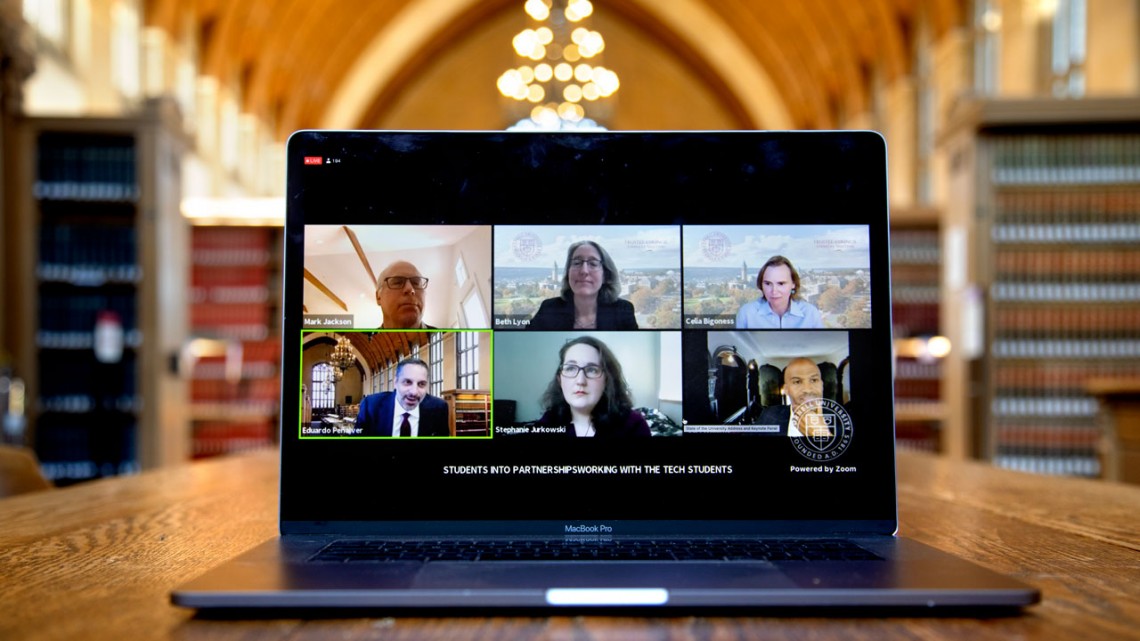
Panelists in the Oct. 9 panel, “Keeping the Promise: Stories from the Front Lines.” Clockwise from top left: Mark Jackson ’81, J.D. ’85, adjunct professor of law; Beth Lyon, associate dean for experiential education and clinical program director at the Law School; Celia Bigoness, associate clinical professor of law; Carlton Williams, adjunct professor of law; Stephanie Jurkowski, J.D. ’19; and Eduardo Peñalver ’94, the Allan R. Tessler Dean and Professor of Law, who moderated the panel.
Homecoming keynote highlights Law School clinics
By Melanie Lefkowitz
When students in Carlton Williams’ legal practicum wanted to help two high-need organizations – Law for Black Lives and the Water Protector Legal Collective – he feared it would be too much work for them.
The students disagreed.
“They acted like lawyers in the highest sense – they had sculpted an argument, gave an introduction, supporting points, references to other work that they had done, and a closing statement about why they could do more work,” said Williams, adjunct professor of law, speaking Oct. 9 during “Keeping the Promise: Stories from the Front Lines,” StayHomecoming’s keynote panel. “It brought me nearly to tears.”
Williams’ Movement Lawyering Practicum, which aims to provide legal assistance to organizations working to change society, was one of four clinical programs featured during the virtual discussion. A 60-year-old tradition at Cornell Law School, clinics offer students real-world experience while aiding those who might not be able to afford legal services otherwise. It’s an experiential approach that both enriches education and advances the university’s land-grant mission.
“A commitment to public service has appropriately been an intrinsic part of Cornell Law School’s identity from the very beginning,” said Eduardo Peñalver ’94, the Allan R. Tessler Dean and Professor of Law, who moderated the panel.
Peñalver highlighted some Law School alumni in public service – from Samuel Leibowitz, J.D. Class of 1915, who represented the Scottsboro Boys, African American teenagers wrongly accused of raping two white women, to Rep. Sharice Davids, J.D. ’10, (D-Kansas), one of the first two Native American members of the U.S. House of Representatives and the first openly gay representative from Kansas.
“Now, an important way that Cornell Law School keeps faith with our founding commitment to public service is through our law clinics,” Peñalver said. “Law clinics provide law students with a [valuable] opportunity to learn hands-on skills while also providing… badly needed legal services.”
The popularity of law clinics has surged in recent years, with 70% of Cornell law students participating in 2020, compared with 15% of students 20 years ago, said Beth Lyon, associate dean for experiential education and clinical program director at the Law School. Future goals for the program, Lyon said, include establishing an inter-professional clinical presence in New York City and a clinical teaching fellow program.
Lyon, who also founded the Farmworker Legal Assistance Clinic, highlighted clinical program collaborations with other Cornell units including the ILR School, Weill Cornell Medicine and the Cornell S.C. Johnson College of Business.
“These cross-disciplinary connections allow students to work in teams bringing multiple skill sets to bear on complex problems, while navigating very different professional cultures,” she said.
While describing the students’ work in the farmworker clinic, which has taken them across New York state and as far away as Indonesia, Mexico and California’s Central Valley, Lyon displayed a photo of staff and students doing outreach at a New York state farm, in which one of the farmworkers was hiding his face. “Helping students to earn the trust and keep the trust of people who cannot even safely appear in a casual group photo is one of the key goals of the clinic,” she said.
The panel also featured the work of the Entrepreneurship Law Clinic, which partners with programs across Cornell and beyond in areas ranging from food and retail to computer science and engineering, biomedicine, life sciences, finance and education.
“We have a world-class research institution that is a prime source of innovation,” said Celia Bigoness, associate clinical professor of law and founder of the clinic, now in its third year. “It was an opportunity for our law students and our law school to assist in the ongoing effort to commercialize technology, and to really contribute to our local economy in a meaningful way.”
The First Amendment Clinic, a student-inspired clinic also in its third year, aims to “protect the free-speech rights of journalists and others, and to train the next generation of First Amendment lawyers,” said Mark Jackson ’81, J.D. ’85, adjunct professor of law and director of the clinic.
This year, its accomplishments include successfully co-representing the owner of the Geneva Believer blog, who faced a defamation action after posting stories about local government’s potential conflicts of interest with a construction company, and helping The New York Times obtain information from the Centers for Disease Control and Prevention, which led to a front-page story about the disproportionate impact of COVID-19 on minority communities.
“That story really changed the national conversation,” Jackson said.
For Stephanie Jurkowski, J.D. ’19, participating in clinics not only taught her about different areas of the law and how to effectively collaborate, it gave her confidence.
“Having had that exposure to actual clients allayed some of the anxiety I had about going out into the world and practicing law,” said Jurkowski, now a senior court attorney with the New York State Court of Appeals. “I come from a relatively poor family; I’d never met a lawyer until well into my adulthood. And although I knew what they did, I didn’t really know what that entailed... it really opened my eyes to types of law practices I had not previously considered.”
Media Contact
Get Cornell news delivered right to your inbox.
Subscribe
